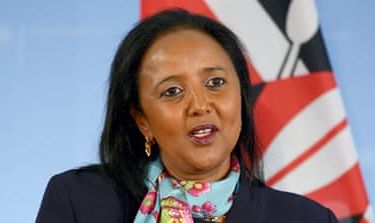Inside the African Union race: Why the favourites lost
How did Kenya’s Amina and Senegal’s Bathily lose the election for African Union Commission chairperson?

Addis Ababa, Ethiopia – It is the morning after the night before and the cold chill of the night have lifted.
At the African Union headquarters in Addis Ababa it’s post mortem time and everyone is asking one question: how did the favourites, Amina Mohamed, of Kenya, and Abdoulaye Bathily, of Senegal, lose?
Keep reading
list of 4 itemsIt is time for a new Africa beyond borders and boundaries
Addis summit raises questions about AU’s muted stance on Ethiopia rifts
It is high time the AU takes a firm stance against Ethiopia’s aggressions
Their people had walked around the summit halls and hotel lobbies with a swagger – chests puffed, chins up and smiles from ear to ear.
Team Kenya put the champagne on ice and the invites to the celebration party at one of the five-star hotels were extended to friends and allies. But this was before the heads of state voted.
Kenya ran the best PR at the summit. President Kenyatta was one of the first heads of state to land and lobby in Ethiopia. It looked like a done deal. Or so the press corp gathered at the summit were made to believe.
WATCH: Kenya’s Amina Mohamed talks to Al Jazeera’s UpFront
In the end, Kenya was beaten to the AU’s top seat by a candidate from one of the less glamorous countries on the continent, and the defeat left egos pricked and confidence crushed.
But why did Kenya’s top diplomat lose the closely fought contest? Many theories, some true and others not so true, have been put forward.
Contrary to some rumours flying around the corridors of the summit building, Amina did not lose because some leaders preferred a male chairman, a senior AU official who was present when the leaders cast their ballot told Al Jazeera.
“Gender did not play a part. Many leaders were in favour of having a female leader at the top because the AU chairperson and deputy AU commissioner are both male”, the senior official, who did not want to be named, said. “Amina winning would have brought some balance to the AU top table.”
One more likely reason, officials said, was that Kenya did not make its stand on the disputed territory of Western Sahara clear.
When lobbying the pro-Morocco camp Kenya, sources told us, said it was in favour of Morocco’s readmission to the AU. But when Kenyan officials met the pro-Polisario camp they said they were not.
Kenyan officials refused to publicly clarify what their position was.
This got Amina some votes but backfired in other cases, a diplomat from a neighbouring country told Al Jazeera.
READ MORE: Leaders gather to elect AU chair, re-examine key issues
The Kenyan candidate has also been a fierce critic of the International Criminal Court and this did not sit well with the countries who are in favour of the Hague-based court, which has been often accused of bias against African nations.
Amina, who is not a career politician unlike her opponents, is a first-term foreign minister and lacks the weight and experience of dealing with major security matters, some analysts said.
The winner, Moussa Faki, is a former Chadian prime minister and is currently foreign affairs minister at a time when N’Djamena is leading the regional fight against the armed group Boko Haram.
Amina’s opponents hammered this point home when seeking the backing of undecided leaders.
Faki also had the advantage of previously holding a senior position at the AU. The Chadian was a former chairman of AU’s Economic, Social and Cultural Council and knew better than any other candidate how to sell himself.
Idris Deby, the president of Chad and Faki’s boss, was until yesterday the chairman of the continental body and this also could have only helped.
READ MORE: Chad’s Moussa Faki Mahamat named AU Commission chair
Some heads of state saw Amina as too close to President Kenyatta and questioned whether she could be truly neutral. Would she be able to stand up to Uhuru if elected, many asked?
In Bathily’s case, many saw him as France’s man and, discomfited with that, took their votes elsewhere.
Here in Addis Ababa, Senegal is also seen as the main supporter of Morocco’s now successful bid to rejoin the AU. So pro-Polisario votes went to other candidates despite the tough-talking academic being a long-term Polisario supporter.
The other candidates, Pelonomi Venson-Moitoi, a veteran minister from Botswana, and Mba Mokuy, from Equatorial Guinea, were never favoured.
Many heads of state, it seems, saw Faki as a safe pair of hands at a time when the organisation is going through major reforms. His performance will be watched closely by those he beat to the job.
Follow Hamza Mohamed on Twitter: @Hamza_Africa